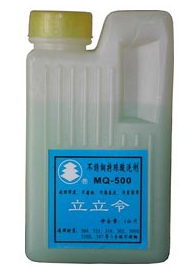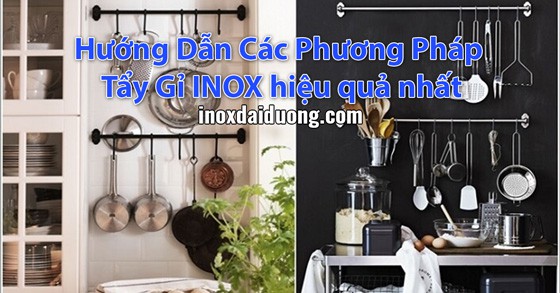For some reasons the protecting film of stainless steel surface can be destructed and recovery process has stopped causing rust on surface. As below, Dai Duong will advise some simple methods for removal stainless steel rust with findable material, an be applied for stainless steel tool in your house and huge stainless steel constructions.
Nội dung chính
1. Stainless steel rust removal simple methods in house
a) Rust removal by alum
Chemical formula: K2SO4.Al2(SO4)3.24H2O
When alum is dissolved in water, there is reversible hydrolysis reaction:
Al3+ + 3H2O → Al(OH)3↓ + 3H
In which AL(OH)3 is a colloidal form with a developed surface, absorbing rust (Fe2O3) and pulling rust out of the stainless steel surface.
Methods of implementation: boil 50g alum with about 1 liter of water, after the alum dissolved completely, wait for the water to cool down (you can use it while it is still warm), dip a towel in the water wring to slightly moist then rub the rusty places on stainless steel utensils. They will be shiny again very soon!
Kindly note: should only use this method with small surfaces
b) Rust removal by washed rice water
Chemical formula: Anthocyanin, vitamin B, vitamin E, iron, lignin, manganese, magnesium, potassium, selenium, zinc, copper… → washed rice water is a very strong antioxidant.
Methods of implementation: take the water which used to wash the rice for the first time into a small bowl, then soak rusty tool in it for about half day.
Kindly note: applied on stainless steel knives, plates and spoons that have not been used for a long time
c) Rust removal by lemon juice & salt
Chemical formula: lemon juice contains nearly 8% citrid acid, pH 2 – 3 and salt is sodium chloride NaCl.
Methods of implementation: sprinkle salt on the stainless steel surface, then squeeze lemon juice on it for 2 – 3 hours. Next step, use the lemon zest to rub on the above mixture so you can remove rust without damaging the metal.
Kindly note: applied on small surface such as kinves, plates, spoons, spot, stainless stell pots that have not been used for a long time
d) Rust removal by baking soda & vinegar combination
Chemical formula of baking soda: NaHCO3
Chemical formuala of vinegar: CH3COOH
Methods of implementation: put about 2 table spoons of baking soda in the bowl, add a little vinegar (they will boil because of chemical reaction), mix them up and the mixture can be like toothpaste (if it’s too loose, you should add more baking soda, if it’s too condensed, you should add more vinegar). After stirring, use a spoons to apply the mixture to the rusted areas then wash with soap and water.
See more:
2. Stainless steel rust removal with specialized chemical
a) Rust remover MQ-500

Origin: China
Method of implementation: dilute the solution with water at a ratio of 2:10 or 5:10 depends on level of rusty you want to remove, use a paint brush or a soft cloth to absorb the liquid and spread evenly on the surface where you need to remove a thin layer of about 1 mm (should keep the object to be cleaned in a cool, ventilated place, avoid directly sun to minimize the fading of the material), wait for about 30 minutes, if it’s winter, the absorbance time may be longer then clean the surface with a diluted soap solution then rinse with water.
Note: avoid letting the liquid get into your eyes, if it’s got into your eyes, wash immediately with clean water and should see a doctor, wash your hands thoroughly after using.
Advantages: Stainless steel rust removal liquid has a very strong chemical activity, can remove heavy rust stains and whiten weld lines very well.
Disadvantages: Due to it ‘s high acidity, after rust removal with MQ – 500, it must be washed immediately with dilute soap and easily cause surface blur after used.
b) Rust removal SR-100

Origin: Korea
Method of implementation: use a spray bottle or soft cloth to absorb the liquid and spread evenly on the rusted area to be removed, wait for about 5 minutes. Then use a soft brush or cloth soaked in clean water to wipe the rust stains.
Advantages: easy to volatile, can both clean rust stains and polish stainless steel surface
Disadvantages: average rust removal ability, high cost
Warning: for rust removal with specialized chemicals, you should consult a person with expertise in mechanical and chemical treatment. This method should only be applied to the cases of cleaning constructions using stainless steel contaminated with impurities or improperly maintained and cleaned, causing rust on surface.
Related posts:
Follow Fanpage Stainless Steel Dai Duong to receive more information about stainless steel products!
Editorial Board: O S S Dai Duong



CÔNG TY CỔ PHẦN QUỐC TẾ ĐẠI DƯƠNG O S S
Inox Đại Dương cam kết cung cấp vật tư inox đạt chuẩn – đúng nguồn gốc – đúng chất lượng, giúp doanh nghiệp yên tâm sản xuất và nâng cao uy tín thương hiệu.
Nếu bạn cần hỗ trợ về sản phẩm hoặc báo giá nhanh, vui lòng liên hệ với chúng tôi qua thông tin dưới đây:
Xem chính sách nội dung